10 Best Ecommerce Platforms for Your Online Business Growth in 2026
- Modified: 5 May 2025
- 15 min read
- Ecommerce


Heather Cameron
Author
Heather is here to inform and inspire our readers. Boasting eight years in the world of digital marketing, working in diverse industries like finance and travel, she has experience writing for various audiences. As Osome’s resident copywriter, Heather crafts compelling content, including expert guides, helpful accounting tips, and insights into the latest fintech trends that will help entrepreneurs, founders and small business owners in Hong Kong take their businesses to the next level.
Need an ecommerce platform for your online store in 2026? This guide covers 10 of the best ecommerce platforms, highlighting their key features and benefits to help you make the best choice.
Key Takeaways
- Ecommerce platforms serve as comprehensive solutions for managing ecommerce business activities, including marketing, sales, and operations, and vary in features based on business needs.
- Key ecommerce features to prioritise when selecting an ecommerce platform include a functional free plan with free themes to get you started, custom pricing abilities, reasonable transaction fees, user-friendly interfaces, mobile optimisation, diverse payment options, and omnichannel selling capabilities.
- Understanding budget considerations, business model compatibility, and platform scalability are essential factors in choosing the right ecommerce platform for sustained growth.
What Are Ecommerce Platforms?
An ecommerce platform is a centralised solution that helps ecommerce sites manage their online marketing, sales, and operations. It is the command centre for your ecommerce store, providing everything from an ecommerce website builder, customisable themes for brand consistency, inventory system to payment processing. In today’s online marketplace, a robust ecommerce platform is crucial for meeting customer needs and staying competitive.
The best ecommerce platform is tailored to serve your ecommerce business goal. Are you looking for a powerful site builder to visualise your design or a streamlined process to automate your sales and marketing? The choice depends on your specific business needs.
Choosing the right ecommerce platform is only the beginning. To ensure your online store runs smoothly and efficiently, you'll also need to consider the importance of ecommerce accounting. This is what Osome can help with! Our expert team ensures your financial records are accurate and compliant while you focus on growing your business.

You should also know the difference between a self-hosted and a hosted ecommerce platform. Hosted ecommerce platforms provide a hassle-free experience with built-in security and online and phone technical support but may have limited customisation options. A self-hosted ecommerce website offers more control and customisation but comes with higher risks of security and technical issues.
Key features of ecommerce platforms
When choosing the best ecommerce platform, you should take the following ecommerce features into consideration:
- User-friendly interface
- Mobile optimisation
- Custom pricing
- Wide range of payment options
- Omnichannel selling capabilities
- Abandoned cart recovery
Your interface is essential for facilitating easy navigation and quick management, both for you and your customers. For example, a clear customer account dashboard and site navigation allow your customers to complete their purchases effortlessly. Meanwhile, a robust account centre is likely to keep your customers coming back.
Custom pricing gives you total control over your sales and revenue structure, and often comes with functions allowing discounts and special promos so you can attract more customers.
Mobile optimisation is another critical feature. With most online traffic now coming from mobile devices, having a mobile-friendly existing website is not just a bonus but a necessity. This ensures your customers can shop seamlessly, regardless of their device.
Additionally, offering a wide range of payment options can significantly boost your sales, as it caters to diverse customer preferences and locations.
Lastly, omnichannel selling capabilities are becoming increasingly important. This feature allows you to integrate various sales channels, such as social media, marketplaces, and physical stores, providing valuable analytics and insights that can help you refine your business strategy.
Types of ecommerce platforms
There are various ecommerce platform types, each with its own set of advantages and drawbacks.
A SaaS (Software as a Service) ecommerce platform is a cloud-based solution that simplifies ecommerce site management by providing essential services managed by the provider. This includes:
- Product updates
- Security
- Hosting
- PCI compliance
This allows businesses to focus on growth rather than technical details.
Open-source options, such as OpenCart, offer extensive customisation opportunities by allowing users to modify all aspects of the code. While this provides greater flexibility, it also requires more technical expertise and can be more time-consuming to manage. Self-hosted ecommerce platforms require users to manage their own server space or pay for hosting services, adding complexity but offering increased control.
Composable commerce and headless commerce are newer approaches that offer even more flexibility. Composable commerce allows businesses to create modular ecommerce solutions, integrating and managing different components independently. Headless commerce, a form of composable commerce, separates the front end from the back end, providing additional flexibility in component integration. These types of platforms can be particularly beneficial for businesses looking to scale and customise their ecommerce capabilities.
Best Ecommerce Platforms in 2026
Selecting the right ecommerce platform is crucial for your success. The best ecommerce platform in 2014 often has unique features and flexible pricing plans catering to various business sizes and needs. From well-established giants like Shopify and BigCommerce to innovative newcomers, the choices are abundant.
Having an ecommerce presence is essential for brands to compete effectively in today’s market. The platforms we will discuss have been recognised for their ability to support diverse business models, offer robust customer support and integrate with various tools and sales channels.
Let’s dive into 10 of the best ecommerce platform in 2026.
Shopify
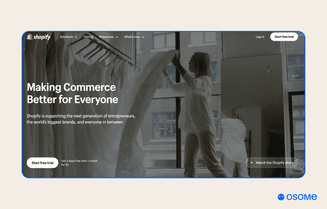
Shopify is known for its versatility and ease of use, making building an online store accessible for businesses with different experience levels. Like all Saas ecommerce platforms, users pay a monthly subscription fee starting at $28 per month. Shopify also offers a free option that allows up to five product listings for new businesses
Shopify offers over 200 customisable templates and no-code mobile-friendly themes. This makes it easy for businesses to create a professional and unique online store without needing extensive technical skills. Additionally, Shopify’s Sidekick AI tool offers real-time support and insights, such as identifying bestselling products and suggesting brand promotion strategies.
Shopify supports multiple sales channels, including website, social media, marketplaces, wholesale, and in-person sales, making it a comprehensive solution for businesses looking to expand their reach. However, note that Shopify may have customisation limitations and additional fees if not using Shopify Payments, which could pose challenges for small businesses.
BigCommerce
BigCommerce is an open SaaS platform for large online stores, serving over 60,000 clients globally. It offers a variety of tools, including web hosting, customisation, search engine optimisation features, and multi-sales channel support. BigCommerce plans start at $29 monthly, with options like Standard, Plus, and Pro, and Enterprise customers can work directly with a sales representative for tailored plans. The platform also has a free plan and a comprehensive suite for the enterprise level.
One of the key strengths of BigCommerce is comprehensive integration. The ecommerce software supports sales channels such as Google Shopping, Facebook, and Amazon and offers features like Buy Online and Pick Up In Store (BOPIS). This makes it an excellent choice for businesses looking to manage multiple stores and sales channels from a single platform.
BigCommerce also provides 24/7 live support and has level 1 PCI compliance for security, ensuring that your online store is safe and reliable. Enterprise customers also have access to additional phone support and customisation, making BigCommerce a preferred choice for large-scale ecommerce operations.
WooCommerce
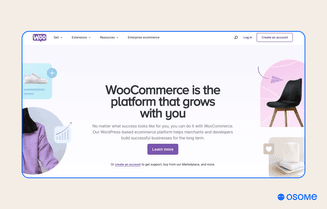
WooCommerce is a free, open-source WordPress plugin that controls 23% of buildable ecommerce pages. It is best suited for newcomers and small to medium businesses with WordPress experience. Users can enhance WooCommerce with paid extensions that add customisable themes, shipping, security, and other standard features.
WooCommerce offers various SEO capabilities and provides an easy-to-navigate shopping experience with quick checkouts. Setting up WooCommerce is free, but monthly hosting costs range from $3.95 to $5,000, depending on your needs. While WooCommerce is highly customisable, it requires WordPress for integration and faces scaling issues, which could be drawbacks for some users.
The add-on structure of WooCommerce can sometimes complicate the overall management of the online store, but its integration with WordPress enhances its ease of use for existing WordPress users. This makes WooCommerce a flexible and powerful option for those familiar with the WordPress ecosystem.
Adobe Commerce
Adobe Commerce, powered by Magento, is an open-source ecommerce platform for developers and large businesses. Creating an online store using Adobe Commerce requires web development skills for effective setup and customisation, offering highly customisable features to meet diverse business needs. The starting price for Adobe Commerce Cloud is around $40,000, with on-premise options starting at $22,000.
One of the significant advantages of Adobe Commerce is its integration with tools such as Adobe Experience Manager and Adobe Stock, enhancing its functionality. This makes it an ideal choice for businesses looking for a highly customisable and scalable ecommerce solution.
Wix
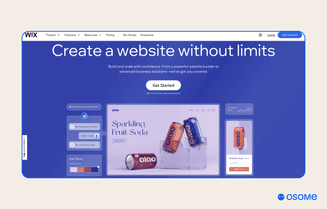
Wix is a drag-and-drop website builder designed for non-technical users, offering customisable templates and a user-friendly interface. To access ecommerce features on Wix, users must upgrade to a paid plan, with the Business Basic plan starting at $29 per month.
While Wix offers a straightforward and accessible way to create an online store, it lacks built-in low-stock alerts and other critical ecommerce features. Additionally, it integrates with platforms like Facebook and Instagram through Ecwid, making it less suitable for established ecommerce businesses due to its limited capabilities.
Squarespace
Squarespace is an ideal platform for beginners and freelancers looking to create an online presence. It utilises a drag-and-drop editor, allowing users to easily design their sites without coding skills. Users can choose from flexible and free templates with a straightforward interface tailored for easy customisation.
Although Squarespace offers a user-friendly experience, it may not provide the advanced ecommerce features needed for more complex business operations. However, for those just starting, it offers a solid foundation for building a professional online store.
Square Online
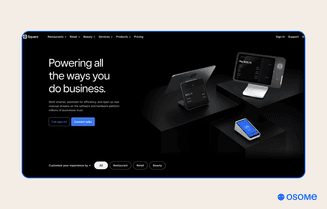
Square Online is suitable for small businesses, offering seamless integration with Square’s payment solutions. The platform integrates with Square’s payment system, which allows for easy management of sales. Previously known as Weebly, Square Online offers a free option for building a store, though upgrading to a paid plan is necessary to connect your own domain.
This platform is particularly advantageous for businesses already using Square’s payment systems, providing a cohesive and efficient ecommerce solution. However, its features may be limited to larger, more complex ecommerce operations.
Shift4Shop
Shift4Shop, formerly known as 3dcart, is a SaaS platform known for its ease of use and mobile-friendly design. It offers flexibility to link with other applications using its API, making it a versatile choice for businesses looking to integrate various tools.
The starting price for paid plans on Shift4Shop is $29 per month, with a flexible pricing model that can accommodate various business sizes and needs. This platform is ideal for businesses seeking a straightforward, user-friendly ecommerce solution with robust features.
PrestaShop

PrestaShop is a free, open-source ecommerce platform that provides extensive customisation capabilities. It is free to install and use, with no monthly fees or commissions on sales, making it an attractive option for budget-conscious businesses. One of PrestaShop’s significant strengths is its ease of creating product listings, which can streamline the setup process for new businesses.
However, while PrestaShop offers flexibility and cost savings, it may require more technical expertise to fully leverage its capabilities. Businesses that prioritise customisation and have the necessary technical skills will find PrestaShop a powerful platform for their ecommerce needs.
Volusion
Volusion primarily serves small to medium-sized brands, helping them establish an online presence with ease. It offers a wide range of payment gateway options, integrating with over 30 different gateways, which provides flexibility for various payment methods. Volusion is particularly ideal for new online shop owners and image-heavy ecommerce businesses due to its user-friendly setup and comprehensive features.
Despite its advantages, Volusion may not offer the advanced features required by larger enterprises. However, for those starting out or running small to medium-sized businesses, it provides a solid, reliable platform to build and grow an ecommerce store.
How To Choose the Right Ecommerce Platform?
Choosing the right ecommerce platform is crucial for the success of your online store. The first steps towards building a successful ecommerce presence involve understanding your business needs. Additionally, defining your goals is essential in this process. This involves considering factors such as features, pricing plans, and future scalability.
Evaluate your current situation and future goals when selecting an ecommerce platform. Make a list of necessary features and cross-reference it with your budget to ensure you choose a platform that aligns with your business objectives and financial constraints.
Researching the best sites for your industry and product type can also provide valuable insights into which platform might be the best fit for your needs.
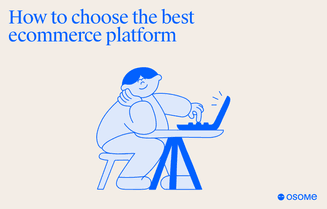
Budget considerations
Understanding the total costs associated with an ecommerce platform is vital for effective budget management. It’s essential to account for ongoing expenses like monthly fees and transaction charges when budgeting for an ecommerce platform. Additional costs may arise from custom features, requiring extra development hours or expertise.
Platforms like Shift4Shop offer a completely free plan for U.S. users, provided they use its payment processing system, which can be a significant cost-saving measure. Evaluating these financial aspects will help you choose a platform that fits within your budget while meeting your business needs.
Business model compatibility
Each ecommerce platform caters to specific business models, including B2B, B2C, dropshipping, and subscription services. It’s important to consider the platform’s ability to support complex transactions and custom pricing structures, especially for B2B models.
Platforms known for their comprehensive B2B functionality can cater to complex business needs, while others may lack support for digital products. Ensure the platform you choose aligns with your business model for smooth operations and future growth.
Scalability and growth
Choosing a scalable ecommerce platform is crucial to handling increasing traffic demands and supporting overall business growth. Select a platform that provides seamless upgrades, allowing integration of new features without compromising performance.
For effective platform selection, incorporate new features into the tech stack and consider future business plans. This ensures that your platform can grow with your business, accommodating new needs and expanding capabilities as required.
Essential Ecommerce Platform Features
Integrating essential features into your ecommerce platform can significantly improve user experience, customer satisfaction, and sales performance. APIs connect different tools, automate processes, and build customised solutions for ecommerce platforms. High or unlimited API call volumes provide smooth data orchestration necessary for efficient ecommerce operations.
These features are fundamental to creating a seamless shopping experience, managing inventory effectively, and driving targeted marketing efforts. The right set of features can make a substantial difference in the efficiency and success of your online store.

Secure payment gateways
Secure payment gateways are essential for facilitating secure transactions and enhancing customer trust in online stores. Most popular ecommerce platforms support various payment methods such as credit cards, PayPal, Apple Pay, and Afterpay to meet customer preferences.
Before launching an ecommerce site, optimise and test gateways with multiple payment methods. This ensures a smooth checkout process and can help in reducing cart abandonment rates, ultimately boosting your sales.
Inventory management
Effective inventory management ensures streamlined operations and customer satisfaction, which is crucial for the success of ecommerce businesses. An ecommerce platform should help you manage inventory by tracking stock levels, managing orders, and automating fulfillment.
Having unlimited product options and variants is a key feature related to product management in an ecommerce platform. Effective inventory systems help businesses automate stock tracking and order management for smoother operations. For instance, Shopify’s interface allows users to easily manage inventory and sales data centrally.
Marketing tools
Built-in marketing tools within ecommerce platforms enhance customer engagement through features like email campaigns and promotions. These tools often feature audience segmentation to tailor content and pricing based on user behaviour.
SEO plays a critical role in increasing visibility and sales for ecommerce businesses. Platforms like BigCommerce provide built-in SEO tools, including optimised URLs, unique URLs, and 301 redirects. However, some ecommerce platforms have minimal SEO features, which can limit online visibility.
Advanced Ecommerce Capabilities
Advanced ecommerce platform features are essential, such as the ability to run promotions and discounts and Google Analytics integration can significantly enhance customer engagement and increase sales.
Investing in advanced capabilities is crucial for long-term success and differentiation. These features can help businesses optimise their operations, develop more effective marketing strategies, and provide a better overall shopping experience.
Customisation options
Ecommerce platforms offer extensive customisation options to cater to the unique needs of different ecommerce businesses. Customisation options include access to a wide range of themes and specialised plugins for added functionality. Utilising customised themes and plugins allows businesses to create a unique shopping experience tailored to their ecommerce website.
Platforms like PrestaShop provide substantial customisation with numerous themes and plugins, enhancing brand presence. These options enable businesses to differentiate themselves in the market and better meet their customers’ needs.
Analytics and reporting
Analytics are crucial for ecommerce businesses as they help understand customer behaviour and optimise sales strategies. A list of ecommerce functionality includes sales reporting, analytics, sales tax calculation, and integration with accounting software.
Advanced analytics tools track consumer interests and behaviours to enhance targeted marketing efforts. Leveraging detailed analytics and tools is vital for optimising sales strategies and driving growth in ecommerce.
Customer support
Numerous platforms offer customer support around the clock. They utilise various channels, including phone, email, and live chat, to assist users. Live chat support enables immediate customer assistance, improving overall satisfaction and resolution times.
Some platforms have limited technical support, which may require payment for assistance. Ensuring that your chosen platform offers robust support is crucial for resolving issues quickly and maintaining a smooth operation.
Summary
In summary, choosing the right platform involves considering various factors such as features, pricing, scalability, and support. Platforms like Shopify, BigCommerce, and WooCommerce offer diverse capabilities to meet different business needs. Understanding your business model and future growth plans is essential for the growth of your ecommerce site.
As we move forward into 2026, the landscape of ecommerce continues to evolve, presenting both challenges and opportunities. By carefully evaluating your options and considering the essential and advanced features discussed in this guide, you can make an informed decision that will drive your business growth and help you stay competitive in the dynamic world of ecommerce.






